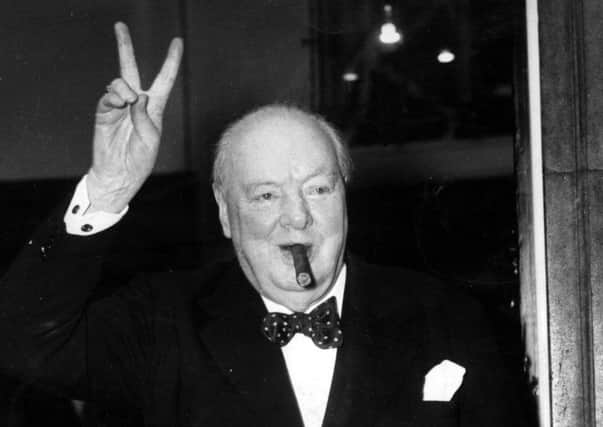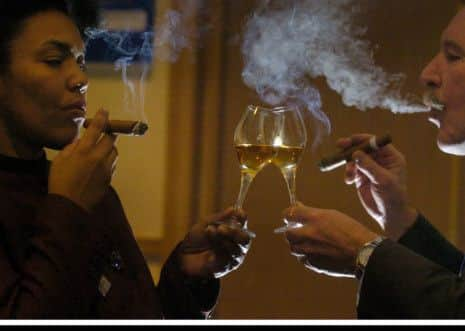Stephen McGinty: Happy in my cigar smoking heaven


If I had to choose the perfect spot to smoke a cigar, it would be on the terrace of the National Hotel in Havana, sitting in one of their comfortable whicker armchairs with the cream cushions, which line three sides of the court yard and face out onto a green lawn that appears to stretch into the horizon and merge with the green grey waters of the Straits of Florida. The air is warm and muggy, and to sit out at night is a dreamy delight, one in which the blue smoke trails curl up into the silhouette of that patron saint of cigar smokers: Sir Winston Churchill. Or, at least it can do, especially if you’ve flown 4,500 miles to track down the story of one man’s love affair, through war and peace, with a torpedo of rolled tobacco leaves.
The romance between Churchill and the most sophisticated and noble guise of Madame Nicotine began when he was an officer cadet at Sandhurst. Sir Randolph Churchill to whom Winston was a perpetual disappointment, sent his son boxes of cigarettes but objected to his graduation to cigars which prompted his son to write in a letter, “you do not like my smoking cigars. I will not do so anymore, I am not fond enough of them in having any difficulty in leaving them off”. It was to be the promise of an aspiring politician, exceptionally fluid as one week later he wrote, “I will take your advice about the cigars and I don’t think I shall often smoke more than one or two a day”. In fact he was to enjoy between five and eight long cigars each day for around 70 years.
Advertisement
Hide AdAdvertisement
Hide AdFor Winston Churchill the cigar would become a political prop as much as a personal pleasure. At political meetings he would distract opponents by allowing the length of ash on his cigar to build up to a point where they were unable to concentrate on their speech for waiting for it to collapse into his lap. During the Second World War Churchill’s cigar was also a symbol of defiance. When Churchill met president Ismet Inonu of Turkey in early 1943 in a bid to persuade him not to side with Germany, he was aware from British intelligence’s intercepts of Turkey’s diplomatic cables that they thought Britain would collapse from lack of supplies. In the meeting Churchill said: “Ah yes, difficult times indeed”, then while pulling out a massive cigar told the president: “We are even down to the tiniest cigars.”


During the war the importation of cigars was prohibited as a needless expense but Churchill still received supplies from well-wishers such as the American Samuel Kaplan who sent over 5,000 cigars and the Cuban government who sent a fine mahogany cabinet, 5ft tall containing 2,400 of the island’s finest cigars. MI5 feared that German agents in Cuba may have poisoned the cigars and told the prime minister not to touch them until Dr Gerald Roche Lynch, the director of the department of chemical pathology at St Mary’s Hospital in London had conducted thorough tests on samples. Of the many animals that gave their lives in service to their country during the Second World War, the most forgotten are the white mice fed a broth of Churchill’s Cigars, a few of whom died in what was later revealed to be natural causes.
Yet such was Churchill’s impatience and fondness for a quality smoke that he ignored MI5’s warning and had already sampled the supplies. Worse, he had passed them around to the war cabinet, as a means of breaking the deadlock in a discussion over how much aid to supply to the Soviet Union. As Lord Balfour, the under-secretary of state at the air ministry recorded in his diaries:
“Turning to the waiting minister, he addressed us thus: ‘Gentlemen, I am now going to try and experiment. Maybe it will result in joy. Maybe it will end in grief. I am about to give you each one of these magnificent cigars.’ He paused, then continued with Churchillian effect. ‘It may be that these each contain some deadly poison.’ He went on, alluding to the possible act of poisoning the entire Defence Committee: ‘It may well be that within days I shall follow sadly the long line of coffins up the aisle of Westminster Abbey. Reviled by the populace, as the man who out Borgia-ed Borgia.”
Instead the cigars were a successful aid to compromise, for as Otto Von Bismarck, once said: “A cigar is a sort of diversion: as the blue smoke curls upwards, the eye involuntarily follows it: the effect is soothing, one feels better tempered, and more inclined to make concessions.”
The reason for this rambling rumination on Winston Churchill and the cigar is the revelation that for the noble stogie it is 1941 and its fiery red eye is now staring, unblinking into the face of defeat and annihilation. The massed ranks of the anti-smoking lobby and the smoking ban mean that after 500 years the last cigar in Britain is expected to be stubbed out in 2026. On Tuesday the Financial Times reported that cigar consumption in Britain had dropped by 20 per cent in the past five years and 80 per cent in the past 20 years. According to figures from HM Revenue & Customs in 1992 we bought 2.1 million kg of cigars and last year it was down to 400,000 kg. While there is a glimmer of light in the market for premium cigars, those made by hand and allowed to age for a better taste and smoke, the prospects for cigars as a whole are not looking bright. There will be many who will celebrate their demise, viewing them as a smelly, unhealthy habit, but I am not among them.
Smoking a cigar is one of life’s great pleasures. Mark Twain said: “If I cannot smoke cigars in Heaven, I shall not go!” Since I had my licence to drink alcohol revoked over 20 years ago, a weekly cigar remains my solitary indulgence. The nicotine gives me the mildest of psychological tingles and the panoply of cutting off the tip and lighting up with a match or two is strangely satisfying. Smoking is, after all, smoking but I would argue that the difference between smoking an occasional cigar and incinerating 20 cigarettes a day is similar to that between those who enjoy a glass of wine with dinner and those who favour a daily bottle of methylated spirits.
Yet to the Scottish Government we are one and the same and if we must smoke it should be at home alone or in sodden huddles on street corners. In England and Wales customers are permitted to sample cigars in specialist cigar shops, but no such slack is permitted in Scotland and while London has seen a growth in Cosas – Comfortable Outdoor Smoking Areas – usually in hotels such as the Mayfair, Dukes or the Marlborough, Scotland has fallen behind. However I would recommend the cigar bothies provided by Hotel Du Vin in Glasgow and Edinburgh while Gleneagles has recently inaugurated an outdoor cigar room next to their Blue Bar though I’ve yet to try it out.
Advertisement
Hide AdAdvertisement
Hide AdThe date of the cigar’s demise may now have been publicly stated by the FT but I doubt it will ever come to pass. The cigar may have been digitally erased from the mouth of Isambard Kingdom Brunel in photographs but no one has yet tried the same approach with Winston Churchill which would be tantamount to cultural vandalism. Sales may continue to fall but there will continue to be a pocket of resistance intent on enjoying the pleasures of a good cigar. Today there are 300,000 of us, down from 700,000 a decade ago but each aware no doubt of Evelyn Waugh’s view that “the most futile and disastrous day seems well spent when it is reviewed through the blue, fragrant smoke of a Havana cigar”.